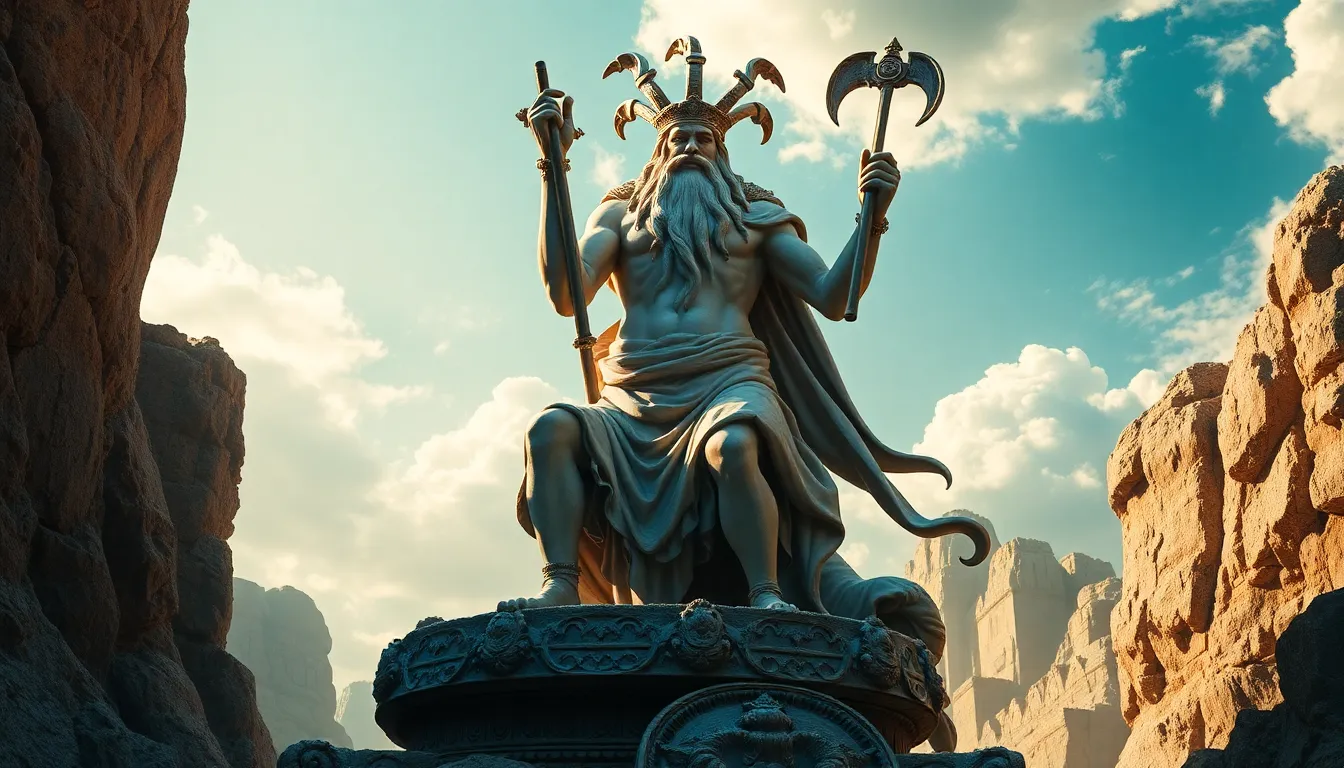The Myths of Cronus: Lessons on Power and Responsibility
I. Introduction
In Greek mythology, Cronus stands as a complex figure embodying the duality of power and its consequences. As the leader of the Titans, his narrative is rich with themes of ambition, tyranny, and the inevitable downfall that follows unchecked authority. Exploring the myths surrounding Cronus offers valuable insights into the nature of power and responsibility, making them relevant even in today’s context.
The importance of examining Cronus’s myths lies in their ability to reflect contemporary challenges in leadership and governance. Through his story, we can discern profound lessons about the responsibilities that accompany power and the dire consequences of ambition without foresight. This article will delve into the various facets of Cronus’s myths, illustrating how they resonate with modern-day leadership dynamics.
II. The Rise of Cronus: From Titan to King
Cronus was one of the Titans, a race of powerful deities who ruled during the Golden Age of Greek mythology. The Titans were known for their immense strength and their dominion over the cosmos before the rise of the Olympian gods. Cronus, the youngest of the Titans, ultimately became the king by overthrowing his father, Uranus. This act was steeped in both ambition and a desire for control, as Cronus sought to establish his reign.
He led a revolt against Uranus, castrating him with a sickle made of flint. This act symbolizes not only Cronus’s ambition but also the violent struggle for power that often accompanies it. Cronus’s ascent to the throne illustrates the idea that the quest for dominance can come at a significant cost, both morally and ethically.
III. The Prophecy and Its Consequences
As Cronus enjoyed his newfound power, a prophecy emerged that foretold he would be overthrown by one of his own children. This prophecy instilled fear and paranoia in Cronus, leading him to take drastic and horrific measures to prevent it. In a desperate attempt to escape his fate, he swallowed each of his offspring—Hestia, Demeter, Hera, Hades, and Poseidon—immediately after their birth.
This chilling reaction to the prophecy serves as a critical lesson: the dangers of attempting to escape fate. Cronus’s fear-driven actions ultimately led to his downfall, highlighting the futility of trying to evade destiny. The moral lesson here is clear: the more one tries to control fate through drastic measures, the more likely they are to fulfill the very prophecy they seek to avoid.
IV. The Cycle of Violence: Cronus and His Children
The actions of Cronus against his children are a poignant reflection of the themes of betrayal and familial conflict. By consuming his offspring, Cronus not only acted out of fear but also betrayed the most fundamental bond of family. This act of violence creates a cycle where power leads to destruction, showcasing the dark side of ambition and the potential for self-sabotage.
Moreover, Cronus’s tyranny emphasizes the responsibilities of leadership. As a ruler, Cronus had the duty to protect and nurture his children, yet he chose to eliminate them out of self-preservation. This choice serves as a reminder that those in positions of power must consider the impact of their decisions on others, particularly those they are meant to lead.
V. The Downfall of Cronus: Consequences of Tyranny
Ultimately, Cronus’s reign came to an end with the rise of his son Zeus. The latter, hidden from Cronus at birth, grew strong and eventually led a rebellion against his father. This conflict culminated in the Titanomachy, a ten-year war between the Titans and the Olympians. Zeus’s victory marked the end of Cronus’s tyranny and the dawn of a new order.
The downfall of Cronus serves as a cautionary tale about the consequences of unchecked power and tyranny. His initial ambition led to a series of violent choices that alienated him from his family and ultimately resulted in his defeat. The narrative highlights the essential balance of power and the importance of just leadership—qualities often overlooked in the pursuit of authority.
VI. The Myths’ Relevance to Modern Leadership
The story of Cronus resonates deeply with contemporary leadership challenges. Many leaders today grapple with issues of authority, responsibility, and the ethical implications of their decisions. Just as Cronus’s reign was marred by paranoia and violence, modern leaders can fall into similar traps when driven by ambition without accountability.
- Authority: The way power is wielded can have far-reaching consequences.
- Responsibility: Leaders must recognize their obligations to those they lead.
- Ethical Governance: The importance of making decisions that consider the welfare of others.
These themes underline the necessity of accountability in positions of power, as a lack of it can lead to a cycle of violence and betrayal, similar to that experienced by Cronus.
VII. The Legacy of Cronus in Popular Culture
Cronus’s influence extends beyond ancient texts into modern literature, film, and art. His character has been interpreted and reinterpreted in various forms, often reflecting contemporary societal issues. From literature to cinema, Cronus’s story serves as a powerful metaphor for the dynamics of power, ambition, and the consequences of tyranny.
In many modern interpretations, Cronus is depicted as a tragic figure whose ambition leads to his downfall. This portrayal often emphasizes the timeless relevance of his story, demonstrating how the struggle for power remains a central theme in storytelling across cultures.
VIII. Conclusion
In conclusion, the myths of Cronus impart essential lessons about the relationship between power and responsibility. His narrative, marked by ambition, fear, and ultimately, downfall, serves as a profound reminder of the consequences that can arise from the misuse of authority. As we reflect on these myths, it is crucial to consider our personal and societal responsibilities in the face of power.
Ultimately, the story of Cronus invites us to engage in a dialogue about ethical leadership and the importance of accountability. By learning from these ancient tales, we can foster a more responsible approach to power in our own lives and communities.




